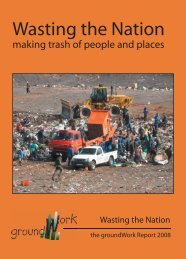Retreaded Tires Case - The Center for International Environmental ...
Retreaded Tires Case - The Center for International Environmental ...
Retreaded Tires Case - The Center for International Environmental ...
- No tags were found...
You also want an ePaper? Increase the reach of your titles
YUMPU automatically turns print PDFs into web optimized ePapers that Google loves.
<strong>The</strong> Brazil - <strong>Retreaded</strong> <strong>Tires</strong> <strong>Case</strong>less favorable than that accorded to like products ofnational origin.• Article I:1 of GATT 1994 by eliminating the import banand financial penalties <strong>for</strong> retreaded tires imported fromother Mercosur countries, while maintaining those measures<strong>for</strong> other imports, including from the EC.• Article XIII:1 of GATT 1994, by applying a prohibitionand restriction on the importation of a product of the territoryof another Member, although the importation of thelike product of all third countries is not similarly prohibitedor restricted.Brazil, in response, argues that the exceptions in Article XXof the GATT justify measures otherwise inconsistent withGATT disciplines on MFN, national treatment, or quantitativerestrictions (such as those at issue in the case) that areadopted to protect health and the environment. In a statementto the WTO’s Committee on Trade and Environment on6 July 2005, Brazil argued:Brazil is . . . of the view that any country lacking capacity to dealadequately with the environmental and health consequences ofthis kind of undesirable commerce shall have fully recognizedtheir rights to impede it. In fact, Article XX of GATT 1994already shelters WTO Members from certain trade practiceswhich represent a menace to human, animal or plant life orhealth. Based on the exception provided <strong>for</strong> by Article XX ofGATT 1994, many WTO Members – especially developingcountries – have adopted restrictive measures as a way to preventimports of shorter lifespan products, thus avoiding prematuregeneration of wastes in their territories.<strong>The</strong> General Exceptions clause in GATT Article XX allowsWTO Members to derogate from other GATT disciplines ifmeasures are necessary to protect human, animal or plantlife or health (paragraph b) or if they relate to the conservationof exhaustible natural resources if such measures aremade effective in conjunction with restrictions on domesticproduction or consumption (paragraph g). <strong>The</strong>se exceptionsare “subject to the requirement that such measures are notapplied in a manner which would constitute a means of arbitraryor unjustifiable discrimination between countries wherethe same conditions prevail, or a disguised restriction oninternational trade” (headnote to Article XX).Emerging WTO jurisprudence on Article XX has interpretedthis introductory phrase as a safeguard against abusiveapplication of health and environment exceptions. <strong>The</strong>Appellate Body has particularly focused on, inter alia,whether exceptions have been applied reasonably, andwhether exceptions have been applied in an open and transparentway. Also, the Appellate Body has explicitly referred tothe notion of sustainable development in trade policy, as containedin the Preamble to the WTO Agreement, and itsimpact on the introductory clause of Article XX.<strong>The</strong> “Necessity” TestWhen adjudicating whether or not an otherwise GATT-inconsistentmeasure can be saved under the Article XX (b)exception, panels must determine whether or not the measureis “necessary” to fulfill the legitimate objectives listedunder that paragraph. In Korea –Beef, the WTO AppellateBody first stated that <strong>for</strong> a measure to be necessary, themeasure does not need to be “indispensable” or“inevitable.” 19 <strong>The</strong> Appellate Body created a three factor balancingtest <strong>for</strong> deciding whether or not a measure is necessarywhen it is not per se indispensable. <strong>The</strong> three factors tobe considered are: (i) the contribution made by the (nonindispensable)measure to the legitimate objective; (ii) theimportance of the common interests or values protected; and(iii) the impact of the measure on trade.<strong>The</strong> Appellate Body indicated that these elements of theweighing and balancing process were part of the determinationwhether an alternative GATT-consistent or less inconsistentmeasure was reasonably available. That is a key questionthat may determine the success of a defense based onArticle XX(b): whether Brazil could achieve the same level ofenvironmental and health protection by using other reasonablyavailable measures that would be less restrictive totrade. In approaching this question, WTO jurisprudence hasnoted the importance of looking at, inter alia, the importanceof the values protected. 20 In that respect, the Appellate Bodyin EC-Asbestos noted that the preservation of human life andhealth was both vital and important in the highest degree,thus making it easier to meet the necessity requirements ofArticle XX(b). Additionally, WTO Jurisprudence on “necessity”has also considered the costs associated with alternativemeasures and the difficulties in the implementation of analternative measure. For example, in U.S. – Gambling(which involved the GATS), the Appellate Body found that analternative measure that is merely theoretical in nature maynot be considered reasonably available. 21 This would includesituations where the responding Member is not capable oftaking an alternative measure or situations where the measureimposes an undue burden on that Member (e.g., prohibitivecost or substantial technical difficulties).4 March 2006
















